 Return to Season 1 Index
Return to Season 1 Index
Episode 7
Writer: Ken Kolb
Director: Joseph H. Lewis
Original Air Date 11/11/1958
Cast
Chuck Connors as Lucas McCain
Johnny Crawford as Mark McCain
Paul Fix as Marshal Micah Torrance
Guest Cast
Joe Bassett, born Joseph George Bassett, was an American film and television actor who appeared in 48 television shows and movies in a 13-year career. Many of his acting roles were in westerns, including "Tales of the Texas Rangers" (1955–1959), "Have Gun – Will Travel" (1957–1963), "Gunsmoke" (1955–1975), "Wagon Train" (1957–1965) and "The Life and Legend of Wyatt Earp" (1955–1961). Bassett made two appearances in THE RIFLEMAN, portraying Nat Gilkey in "Duel of Honor" (episode 7) and Sammy Morody in "The Grasshopper" (episode 63).
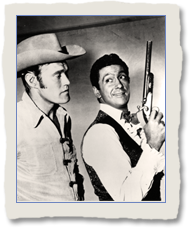
Cesare Danova, born Cesare Deitinger in Bergamo, Italy, was a television and screen actor whose career spanned nearly five decades. Tall, handsome and possessed of an aristocratic air, he adopted the stage name Danova when he turned to acting in Rome at the end of World War II. After appearing in more than 20 films in Europe, he was signed to a long-term contract by MGM.
Originally groomed for the lead role in "Ben Hur" (1959), director William Wyler instead tapped Charleton Heston for the part, whose performance garnered the Oscar for Best Actor in a Leading Role. Danova's next big break came when he was cast in "Cleopatra" (1963). The following year he starred in "Viva Las Vegas" as Elvis Presley's rival for both Ann Margaret's Rusty Martin and for the Las Vegas Grand Prix.
Two of his best film roles came later in Danova's career, first in 1973, playing the neighborhood Mafia Don, Giovanni Cappa, in Martian Scorsese's "Mean Streets" and in 1978, playing the corrupt town mayor, Carmine DePasto, in "National Lampoon's Animal House."
Danova also appeared in numerous television shows throughout his career. He co-starred in the Golden-Globe nominated TV series, "Garrison's Guerillas" (1967–1968), which was inspired by the film, "The Dirty Dozen." When Danova first came to America, he reportedly said he wanted to lose his accent so that he could play an American cowboy. In 1958, he got his wish, debuting on American television in THE RIFLEMAN. He portrayed Count DiMontova in "Duel of Honor" (episode 7) and made two additional appearances, playing the title role in "Baranca" (episode 82) and Mario Rosati in "The Guest" (episode 165).
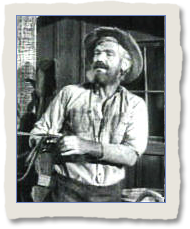
John Dierkes was an American actor who appeared in numerous films and television shows in a career spanning 25 years. Previously, he worked in the United States Department of State and later joined the Red Cross, serving in Great Britain during World War II, where he met film Director, John Huston, who encouraged him to become an actor. After the war, however, he returned to government work, but eventually his employer, this time the US Treasury Department, sent him to Hollywood to be a technical consultant on the 1948 film, "The Day the Earth Stood Still." In the same year, Orson Welles cast him in his adaptation of Shakespeare's "Macbeth." Dierkes returned to his Treasury Department job, but John Huston coaxed him back to Hollywood to appear in his film, "The Red Badge of Courage" (1951). Among his numerous film credits, Dierkes portrayed Morgan Ryker in the western classic "Shane" (1053); and he appeared in the Yul Brynner film, "The Buccaneer" (1958);the film adaptation of Gore Vidal's "The Left Handed Gun" (1958), starring Paul Newman; "The Hanging Tree" (1959), starring Gary Cooper; John Wayne's "The Alamo" (1960); and "Oklahoma Crude" (1973), starring George C. Scott and Faye Dunaway.
Dierkes made two guest appearances in THE RIFLEMAN, playing the semi-regular character, Nels Svenson (variously Swenson, Swensen). One of seven actors to play the role of the blacksmith, he appeared in "Duel of Honor" (episode 7) and "The Sister" (episode 9). Dierkes appeared in many other television shows, including numerous Westerns, including "The Adventures of Rin Tin Tin" (1955), "Wagon Train" (1957–1959), "Bonanza" (1959), "Peter Gunn" (1961), "Rawhide" (1962–1964) and "Gunsmoke" (1956–1973).
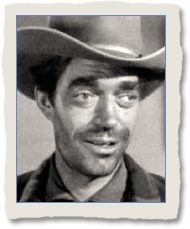
Jack Elam was an American film and television actor whose career spanned more than 40 years. He grew up in difficult circumstances, moving from the households of relatives and father, stepmother and siblings after his mother passed away. He attended Santa Monica Junior College in California, then worked as an accountant and later, he briefly was manager of the Bel Air Hotel. Purportedly, he got his first movie job by trading his accounting services for a role. His film debut was a role in "She Shoulda Said No!" (1949), an exploitation film about the vices of marijuana. Elam quickly became one of the most memorable supporting players in Hollywood and became well-known for playing villains in western genre and gangster films. He played up a near-demented screen persona, which was enhanced by a wandering left eye rendered sightless from a childhood fight. Although he was a highly recognizable villain throughout most of his acting career, in later years he played more comedic roles, becoming more winsome, if still grizzled and slightly crazed.
Elam made five guest appearances in THE RIFLEMAN, portraying different characters in each episode. He played Sim Groder in "Duel of Honor" (episode 7), Gavin Martin in "Tension" (episode 45), Gus Smith in "Shotgun Man" (episode 69), Gates in "The Knight Errant" (episode 117) and Russell, the Pool Shark, in "Shattered Idol" (episode 120). In 1994, Elam was inducted into the Hall of Great Western Performers of the National Cowboy and Western Heritage Museum.
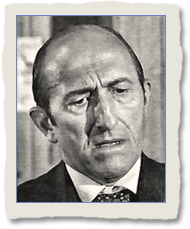
John Harmon was an American actor who appeared in over 250 roles in film and television from the 1930's through the 1970's. His early roles were mostly uncredited, but he was cast in a wide variety of genres and played many different kinds of characters. Harmon appeared in 15 episodes of THE RIFLEMAN as Eddie Halstead Hotel Clerk at the Hotel Madera. The character of Halstead was first introduced in episode 7, "Duel of Honor."
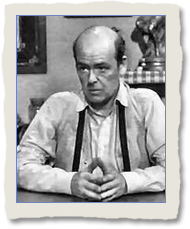
Bill Quinn was an American actor whose early career began in the 1920's in silent films and ended with the 1989 science fiction film, "Star Trek V: The Final Frontier." Perhaps, his best-known role was Mr. Ranseleer, Archie Bunker's blind friend in "All In The Family" (1971-1978). He also was a regular character in the Carroll O'Connor spin-off, "Archie Bunker's Place." Quinn's other television credits include roles in "The Odd Couple" (1970-1975), "McHale's Navy" (1962-1966), and "The Mary Tyler Moore Show" (1970-1977), in which he play Mary Richard's father. In 1971, he appeared in Universal Pictures' "How to Frame a Figg" starring Don Knotts. Quinn was a regular character in THE RIFLEMAN, appearing in 40 episodes as Sweeney, the Owner/Bartender of the North Fork Saloon.
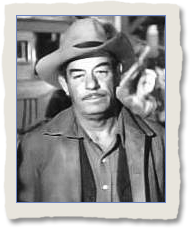
Glenn Strange was an American actor most well known for playing roles in the Western and Horror genres. Growing up in New Mexico, he had been a rancher, cowboy and rodeo performer—a background that lent authenticity to the Western characters he played. In the 1920's he learned to play the fiddle and guitar, and toured the country with a radio singing group, the Arizona Wranglers. He came to Hollywood in 1930 with the ensemble and began landing small parts in "B" Westerns. At 6' 5" tall, he had a large, rugged frame and heavy features—attributes that tended to typecast him as villainous and nefarious characters. Later, a different Western characterization would supplant the archetypal villains he portrayed earlier in his career—Sam Noonan, the bartender on CBS's "Gunsmoke" (1961–1973) television series would become his most enduring TV personae. He appeared in 215 episodes of "Gunsmoke."
Boris Karloff, the quintessential Horror genre star, portrayed Frankenstein's monster in three films, but in 1944 passed the baton to Strange, who played the monster role in three Universal films, "House of Frankenstein" (1944), "House of Dracula" (1945) and the camp horror-comedy film, "Bud Abbott and Lou Costello Meet Frankenstein" (1948). Ironically, in "House of Frankenstein" Karloff was cast as the villainous Dr. Niemann opposite Strange as the monster, formerly Karloff's signature character.
Beginning in the late 1940's, Strange segued into television and for the rest of his career appeared in numerous shows, again, frequently appearing in Westerns. He guest-starred in six episodes of THE RIFLEMAN, playing variations of the same character in each outing. He was Cole, the stagecoach driver, in "Duel of Honor" (episode 7) and a shotgun guard on the stagecoach in "The Dead-eye Kid" (episode 20), then Joey, the stagecoach driver, in "The Woman" (episode 32), followed by appearances as an unnamed stagecoach driver in "The Blowout" (episode 43), "The Spiked Rifle" (episode 49) and "Miss Bertie" (episode 90). Among the many television shows in which he appeared, Strange guest-starred in "Annie Oakley" (1954–1956), "Death Valley Days" (1954 1958), "The Adventures of Champion" (1955–1956), "The Cisco Kid" (1955–1956) and "The Life and Legend of Wyatt Earp" (1955 1960). He passed away in 1973, ending his career playing Sam Noonan, the bartender on "Gunsmoke," whom he played for 12 years.
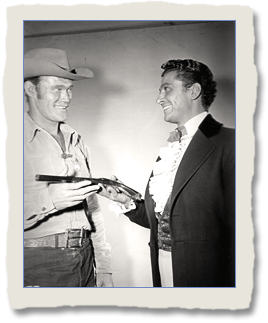
A handsome Italian count arrives in North Fork. The town bully ridicules his manner of speech and dress, and provokes the Count to challenge him to a duel. Lucas, who has befriended the Count, is asked to serve as his second. He tries to dissuade him from the duel, knowing the Count is accustomed to the formal European method of dueling, but is at a tremendous disadvantage against the western six-gun. The Count refuses to back out and arranges a surprise for the town bully.
